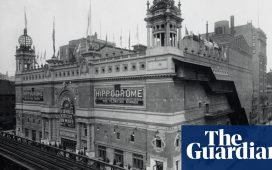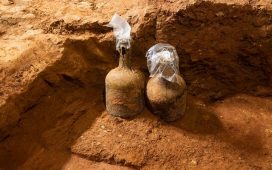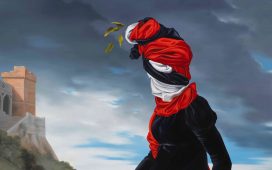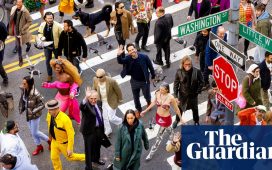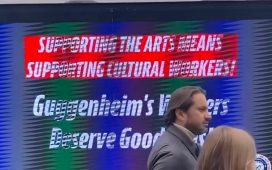Following a citywide, community-advised review of Chicago’s public art collection, a new report recommends that the city take down more than a dozen contentious monuments and plaques, including all statues of Christopher Columbus.
The “Chicago Monuments Project: Recommendations for the Current & Future Collection” report, released 19 August, compiles findings from a nearly two-year process intended to reckon with local monuments that are problematic or tell an incomplete history of Chicago or the United States. The 73-page document also proposes next steps for reviewed works, from removing to modifying them, whether through the addition of signage or a commissioned artwork.
An appointed advisory committee of community leaders, artists, architects, curators, scholars and city officials reviewed 41 objects they identified as worthy of discussion, from the more than 500 under the jurisdiction of Chicago Park District (Parks) and Chicago Department of Cultural Affairs and Special Events (DCASE). Most were created between 1893 and the late 1930s, with objects ranging from sculptures that reinforce stereotypes of Indigenous peoples to a bridge plaque that commemorates the city’s “first white child”.
The assessment is the first of its kind in a major US city. It was announced in 2020 by Mayor Lori Lightfoot following the police murder of George Floyd in Minneapolis that spring, which escalated nationwide debates over commemorative public works, from Confederate-era monuments to statues that glorify colonialism and erase the existence of Native Americans. In Chicago, major protests ignited over a monument in downtown’s Grant Park to Columbus, whose arrival to the Americas led to genocide and slavery. The city temporarily removed all three of its Columbus statues in July 2020, and they have since been in storage.
“Many of Chicago’s monuments were based on mythologies of the city’s founding that posed white explorers, missionaries, armies and settlers against the Indigenous tribes and nations of the region,” the report states. “[Their] patrons also helped proliferate idealised representations of American statesmen and military heroes.” The Chicago Monuments Project (CMP), the report continues, “provided a vehicle to address the hard truths of Chicago’s racial history, confronted the ways in which that history has, and has not, been memorialised and developed a framework that elevates new ways to memorialise Chicago’s true and complete history”.
The findings reflect public input that the committee received throughout 2021, with thousands of Chicagoans chiming in through surveys, live discussions, letters and emails. The monument deemed most problematic was the Columbus monument in Grant Park, which was built for the 1933 Century of Progress Chicago World’s Fair and largely funded by the city’s Italian American community; 87% of respondents said it was “Highly problematic/offensive” and 75% felt it should be taken down. The committee is recommending that all three Columbus statues be permanently deinstalled.
Respondents also called for the removal of The Defense, a relief on the DuSable Bridge that portrays a violent confrontation between American Indians and white soldiers. The depiction of Native people was deemed demeaning by 56% of respondents, and more than half said it should be taken down. “There is literally a dead Native person depicted on this relief,” one person commented. “I can’t imagine that we as a society would be OK with something like this if it were any other racial/ethnic group.
The bridge also features a plaque commemorating a mansion that once stood there, and where Ellen Marion Kinzie, identified in the sign as the city’s “first white child”, was born in 1805. The marker “openly prioritises whiteness and denies the existence of Native peoples, and earlier settler Jean Baptiste Point du Sable”, the report states, adding that it should be placed in storage, and that a new sign be commissioned to “tell a more accurate and inclusive story about Chicago’s founding”.
To further redress the city’s memorial landscape, which the report says does not sufficiently include others stories, including those of women and people of colour, and themes of labour, migration and community building, the committee has launched an open call for proposals that reimagine the meaning and role of public monuments. To start, DCASE has also awarded $50,000 grants to eight new temporary or permanent works. These include a community-led monument to victims of gun violence in Chicago; a monument to honour du Sable and Kitihawa, a local Potawatomi woman who was his wife; and a public art project that commemorates the Chicago Race Riot of 1919.
“Launched on the 100th anniversary of the riot, our public art project aims to ignite conversations about past and present racism in Chicago and across the US by creating and installing commemorative markers at each of the 38 locations where someone was killed in 1919,” Peter Cole and Franklin Cosey-Gay, co-chairs of the project, say in a press release. “We hope our public art project, and the related educational work we do, uplifts this history that has been ignored for far too long.”
The City will work through the committee’s recommendations, which include adding new signage to all discussed works that are publicly installed during this lengthy review process. These recommendations “are not the final word on the complex, ever-evolving issues related to justice, public space and our shared history”, DCASE commissioner Erin Harkey says. “The CMP does not intend for the interventions suggested here to preclude later actions that might further correct or expand the narratives in our public spaces. We will continue to engage with Chicago residents in an honest and sincere effort to build a more diverse and representative public art collection that this city and its residents deserve.”

